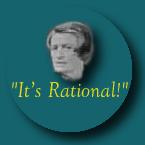ebola?
Bluelight Crew
It seems to me, that this has become pertinent again.
Here is where I break from her:
1. altruism is evil and anti-man.
No. Altruists derive satisfaction from their altruism, so there is really no pure self-destructive altrusism of the sort that Rand describes.
2. through the use of reason, we can discern the objective patterns of the universe and derive the singular truth.
I disagree with this ontology and I think it is the source of a lot of Randist arrogance ("if you disagree, you must be irrational.")
3. The only good is one man's pleasure. Therefore, the moral is to work in self-interest.
This does not work on a systemic level. It is not necessarily so that all individuals working for their own good will in turn create the greatest possible aggregate good.
4. The primary person to person relation is that of trader.
I disagree. This creates an artificial picture of society as the aggregation of atomized individuals. Rather than beginning as traders, human beings begin in social relations...the primary relation being that of cooperative labor.
This relates to Rand's major fallacty that she overlooks cooperative solutions to mutual problems as rational activity.
5. Capitalism rewards those with innovative ideas, for these ideas are the source of wealth, not laboring activity.
This is not true. If it were the case, we would see a wealth of scientists driving rolls royces. Instead, under capitalism, the system rewards those who begin with capital and those who trade their capital shrewdly, rather than those who carry out any really useful task.
ebola
Here is where I break from her:
1. altruism is evil and anti-man.
No. Altruists derive satisfaction from their altruism, so there is really no pure self-destructive altrusism of the sort that Rand describes.
2. through the use of reason, we can discern the objective patterns of the universe and derive the singular truth.
I disagree with this ontology and I think it is the source of a lot of Randist arrogance ("if you disagree, you must be irrational.")
3. The only good is one man's pleasure. Therefore, the moral is to work in self-interest.
This does not work on a systemic level. It is not necessarily so that all individuals working for their own good will in turn create the greatest possible aggregate good.
4. The primary person to person relation is that of trader.
I disagree. This creates an artificial picture of society as the aggregation of atomized individuals. Rather than beginning as traders, human beings begin in social relations...the primary relation being that of cooperative labor.
This relates to Rand's major fallacty that she overlooks cooperative solutions to mutual problems as rational activity.
5. Capitalism rewards those with innovative ideas, for these ideas are the source of wealth, not laboring activity.
This is not true. If it were the case, we would see a wealth of scientists driving rolls royces. Instead, under capitalism, the system rewards those who begin with capital and those who trade their capital shrewdly, rather than those who carry out any really useful task.
ebola






